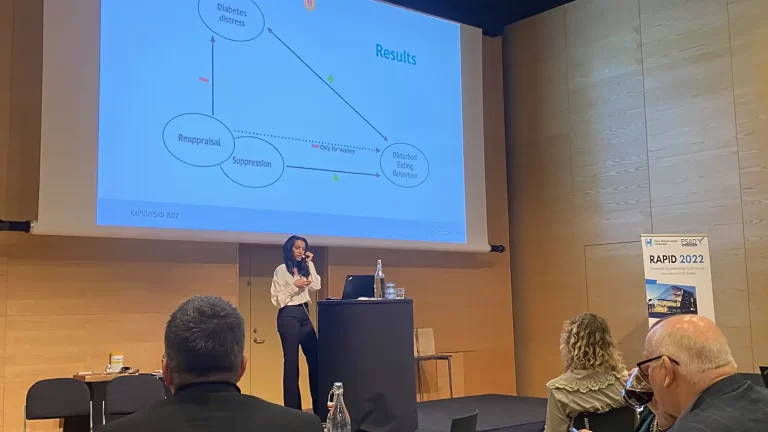Psychosocial Aspect of Diabetes (PSAD) Study Group
Research Accelerating Psychosocial Innovations in Diabetes (RAPID) Conference
Copenhagen, Denmark, Day 1 29th November 2022
Well, it’s my first time out of Australia since COVID became a thing in early 2020 so I thought I’d travel as far as I could…to Copenhagen, Denmark…you can’t get much further than that!! Why come to Copenhagen in the winter? Not for the maximum 5 degree temperatures, that’s for sure!! To attend the ‘Psychosocial Aspects of Diabetes’ (PSAD) first ever ‘Research Accelerating Psychosocial Innovations in Diabetes’ (RAPID) conference. PSAD is a study group that was started for clinician-researchers and people with diabetes to collaboratively work on research projects that aim to improve psychosocial wellbeing for individuals and communities impacted by diabetes.
This 3 day event attracted an impressive 131 participants from an amazing 17 countries…that’s 131 participants from every corner of the world who are here for the one cause…to enhance diabetes care and education by conducting peer reviewed research that ensures it includes psychosocial underpinnings every step of the way from research ideation to research commercialisation.
This 3 day event could not have happened without an incredibly generous grant from Novonordisk in Denmark. This 3 day event also would not have happened without an enormous amount of work from the PSAD executive committee (whom are clinician-researchers themselves) as well as the support from the Steno Diabetes Centre in Denmark.
This 3 day event was opened by the guru of all gurus when it comes to talking about all things psychosocial research, care and education for people with diabetes, Professor Jane Speight. Her keynote presentation was humbling, grounding and inspiring.
Navigating diabetes care : Weathering the storm or seeing the horizon?
Prof Jane Speight
Prof Speight started her presentation by describing how people with diabetes navigate diabetes care. Prof Speight talked us through how some people with diabetes weather the storm of diabetes care whilst other people with diabetes see the horizon. Prof Speight introduced this concept of how “successful navigation depends on 6D vision, not 3D”.
These 6D vision includes : departure, destination, distance, description, direction, duration
Prof Speight went on to explain the research reported reasons for not attending structured diabetes education being :
- Unable due to logistics, medical needs, financials reasons
- Unwilling due to cultural beliefs, perceived benefits, perceived relevance, emotional reasons
Prof Speight further explained the reasons for non-attendance to diabetes education in the following formula :
- (A) Appt logistics + (B) beliefs, distress & coping + (C) clinician relationships = 10-30% non-attendance to diabetes education
As a result of this non-attendance to diabetes education Prof Speight quoted that :
50% of people of diabetes not meeting HbA1C targets
50% of people with diabetes take medications as directed
However, Prof Speight that these statistics above are not the fault of people with diabetes, but rather the fault of the systems and services.
Prof Speight stated then went onto to talk about diabetes distress and how it differs based on age, diabetes type, management and complications. However, she reiterated that regardless of how diabetes distress differs she highlighted that diabetes distress commonly happens for all people with diabetes.
Prof Speight then moved on to talk about how people navigate their diabetes management :
The feelings teenagers have when they are told by their diabetes team that their diabetes is sub-optimal are that they feel dehumanised, guilty, a failure, judged, frustrated.
Clinicians – are more disease focused
Parents – nagged, blamed, shamed teens
Teens – gave up, withdrew from diabetes management
Prof Speight summarised that the moral of this narrative is that everyone in above scenario re teens is frustrated because goals aren’t being met, but no one is stopping to discuss how to change the narrative of supporting teens with diabetes.
Then Prof Speight went on to talk about the clinician-PwD* relationship :
*PwD = person with diabetes
It’s well documented in research that there is far too much pressure on PwD to hold all accountability for how their blood glucose levels (BGLs) act and react.
The researchers at the Australian Centre for Behavioural Research in Diabetes (ACBRD) have conducted research to understand the challenges for clinicians in providing emotional health care to PwD :
- Many clinicians aren’t trained properly which is not their fault; the health curricula is sub-optimal as it doesn’t focus on emotional healthcare
- At big conferences clinicians are attracted to the big keynote presentations and trial updates, and steer away from psychosocial focused presentations
- Many clinicians say it’s not part of their team’s overall care environment, which highlights how important it is for this narrative to change
Prof Speight then went on to talk about one of the most successful and rapidly growing movements across the globe that herself and her colleagues at ACBRD and Diabetes Australia have initiated :
The #LanguageMatters movement is now existing in 14 countries.
Prof Speight encourages more countries to join the movement, but recommend to do so by adapting the #LanguageMatters position statement and principles to their own country’s psychological and sociocultural needs.
Prof Speight went onto describe the latest updates to the #LanguageMatters movement encouraging us all (clinicians, researchers, diabetes community, other stakeholders, policy makers, media, politicians and society) to :
- Remove BIAS – that is to eliminate blame, irreverence, authority, stigma
- Show We CARE – that is to foster curiosity, accuracy, respect, empathy
Prof Speight’s last section of her presentation described how people with diabetes navigate each of their own communities as they learn about their diabetes diagnoses and management needs. There was a large focus of this part of the presentation on diabetes stigma. Prof Speight talked at length about ACBRD’s and Diabetes Australia’s #HeadsUp campaign. When she showed the YouTube video that was designed for this campaign to the delegates, there was an overwhelming round of applause for this YouTube video.
One concern that requires much caution and care going forward is the fear around stigma worsening as people push towards type 2 diabetes remission. The way that this remission narrative is unfolding has the tendency to perpetuate the diabetes stigma that already exists.
As an emerging novice clinician-researcher myself, it was refreshing to hear Prof Speight conclude that we all need to get better at doing both clinical and research work at the same time highlighting that we all have a responsibility for doing both because both clinicians and community cannot thrive in work and life respectively without each of these elements.
We then heard from 2 people living with diabetes who talked about the emotional aspect of life with diabetes…





Walther Jensen from Denmark lives with type 2 diabetes
“How are you?” is rarely asked Walther says. He also mentioned that clinicians never ask what people think about having a condition that is now with them forever.
“Although I don’t feel stigmatised everyday I feel ‘have I done good enough today?’” says Walther.
“I don’t like being called a patient…I am a person with diabetes…I am not my disease…I am me” says Walther.
“Despite having a very nice GP in a very lovely clinic, they never ever asked me ‘how was I doing’…the focus was always on ‘let’s get you back on track’” says Walther.
As a PwD Walther wishes that others being diagnosed with diabetes receives more information on diagnosis as he received nothing not even a brochure or a website.
Tina Back from Denmark lives with type 1 diabetes
Tina was diagnosed T1DM in pregnancy 23 years ago. So she was very motivated in pregnancy for her baby’s health, but she admits she was stressed by a BGL of 8mmol and so became very strict and too restrictive with her diabetes management.
“When I was diagnosed I didn’t think rationally”, which Tina says is an important thing for clinicians to remember.
“Whilst diabetes is 24/7 I don’t view it as a full time job” says Tina.
“There’s a lot of focus on numbers…I was very close to developing an eating disorder…so I would have appreciated someone offering psychological care or if there was someone there who asked me ‘how am I’ or if there was someone that showed they were able to show me how to balance life with diabetes, that would have really helped” recalls Tina.
What eventually helped Tina with her diabetes management was :
- to be a part of a network group
- to have voice
- to be aware of new diabetes treatments
- to see the same health professional at consultations to prevent inconsistent messaging
- to have flexibility in care being offered
- to witness diabetes care teams collaborating together
- to be the centre of my individual needs at the consult
“The mental health aspect of diabetes is essential to acknowledge” says Tina.
After these 2 community members finished talking to us about their lived experiences of having diabetes, we had a Q&A session :
- delegate from India asked ‘but how do we influence those colleagues who don’t agree or endorse psychosocial aspects of diabetes in care and education?’
- In response to this delegate’s question, the conversation started to lean towards involving the community, incorporate peer support influencers, have PwD at the table using #nothingaboutuswithoutus as solutions to address these colleagues resistance to incorporating psychosocial care in diabetes education
Next we heard from presentations in the session titled ‘Diabetes Across The Lifespan’…





ME-MaGDA Study
Dr Amelia Lake
The ME-MaGDA Study is looking at understanding the barriers and enablers to the uptake of postpartum OGTTs for women who had Gestational Diabetes (GDM).
Using the COM-B Model the following themes were found re barriers to doing postpartum OGTT :
- Knowledge important
- Cognitive overload
- Competing demands
- Social influences (particularly for Indian and Chinese women)
- Self-motivation and beliefs about capabilities
Top 3 implementation pathways were almost immediately ready to roll out straight from the interviews that were conducted with ME-MaGDA participants without needing much more work :
- NDSS communication
- Primary Care
- Peer Support
Psychotropic drug use in children, teens and young adults with type 1 diabetes
Shengxin Liu
15% of children with type 1 diabetes have been prescribed psychotropic medications versus 10% of children without type 1 diabetes who were prescribed psychotropic medications.
Most medications were short term or single prescription.
Antipsychotics were the most common medications prescribed for those under 25 years.
ADHD medications were most common medications prescribed for those under 12 years.
More referrals to mental health staff are definitely suggested as a key strategy so that medications are not the first line intervention for children, teens and young adults with type 1 diabetes.
Questions from audience after the presentation :
- It’s overwhelming that so many children are prescribed antipsychotics so would this be because these children are already in medicalised model of care given they have diabetes?
- Could this study be complimented by doing a qualitative study with children, parents, and health professionals to determine what they want or need to consist in their mental health care? For example, do parents and their children prefer more multidisciplinary care, more allied health input, peer support opportunities?
Hippocampal subfields associations with pre-diabetes and type 2 diabetes : The Maastricht Study
Jennifer Monereo-Sanchez
This study corrected for demographics, lifestyle, cardiovascular risks and history, smoking, alcohol intake and BMI.
Smaller volumes in hippocampal subfields were found for those with type 2 diabetes (which was found on MRI).
But there was no significant association.
The reason for doing this study was that there’s been a suggestion that people with type 2 diabetes have a lower cognition so they wanted to confirm this on MRI.
Next 2 presentations were a part of the section ‘Towards a better understanding of diabetes distress’…
Reduced heart rate variability in people with elevated diabetes distress
Dominic Ehrmann
Consistently there was a lower heart rate variability in the study over 26 days who subsequently had higher diabetes distress.
This study hopes to connect a psychosocial intervention with these physical markers of heart rate variability and hypoglycaemia.
Subjective perception of glucose values appears to more important than actual expression to low or high glucose levels for overall diabetes stress
Norbert Hermanns
Technology alone for PwD does not reduce mental load and experiences of diabetes distress.
Deprivation of food choices was significant for people with type 2 diabetes.
Not knowing glucose level was significant for people with type 1 diabetes.
Perceived glucose variability, perceived hyperglycaemia and perceived hypoglycaemia (surprisingly not CGM metrics) were driving the experiences of diabetes distress.
This study validates that we must continue to offer the fundamentals of psychosocial care in the form of conversational consults that offers listening, acknowledging and support strategies so PwD can minimise PERCEPTIONS of things possibly happening. It’s clear that no matter how well devices have been initiated in a person’s diabetes management that they still experience perceived events that diabetes devices will never be able to eliminate.
Next we heard 5 presentations in the ‘Intervention-Focused Studies’ session :
Impact of intensive lifestyle intervention on depression and anxiety in patients with type 2 diabetes
Snehal Kulkarni
There has been no program that screens for mental health issues for people with diabetes in India.
Intervention is only offered if people show signs.
Therefore, so many cases of mental health deterioration goes undiagnosed. This is becoming a huge burden on the Indian society and country.
India currently has about 50-60 patients in each clinic with each consult being 15 minutes.
Understanding the cultural fit of the REDE model for physician-based communication skills training
Dr Shweta Chawak
77 million cases of diabetes exist in India.
61 patients with type 2 diabetes used focus groups and virtual discussions to look into patients’ perceptions of what they want from their diabetes team :
- Friendly health professionals were as important as #LanguageMatters in regards to if people returned to their diabetes team
- Being heard by their health professionals was also as important
- Patients desire for conversation was important to the patients
3 main themes emerged : empathetic listening, conversational consults and friendly health professionals





Understanding perspective about smoking cessation among people with type 2 diabetes and exploring the acceptability of a text-based intervention
Jennifer Jackson
This study was conducted because people with type 2 diabetes who also smoke didn’t quite have their needs met by one care team; diabetes teams couldn’t address smoking; smoking quit team couldn’t deal with diabetes.
Common feelings amongst people with type 2 diabetes : diabetes and depression related to smoking was like a double whammy as the smoking triggers flat affect on top of the distress triggered from the diabetes.
Social isolation and negative healthcare interactions have been two triggers for uptake of smoking for people with type 2 diabetes.
Network groups seem to be important to people with type 2 diabetes who smoke; they have voiced that alcoholics have AA network group so why do smokers not have nicotine replacement network groups?
Needs and expectations of people with diabetes on videoconference-based peer support for diabetes self-management during the COVID19 pandemic
Sarah Toran
4 main themes came up from RE-setting up online peer support group :
- Social and emotional support
- Information and knowledge
- Group structure and format
- Practical support especially with supporting technology use
From Sept to Nov 2020 they had 6 peer support groups that had been set up online.
Some groups stayed online, some returned to face-to-face groups.
All groups still running today and more have been set up.
Self-reported psychosocial outcomes amongst users and non-users of open-source automated insulin deliver systems
Jasmine Schipp
Open-source AID systems (closed loop DIY systems) have been proven to enhance psychosocial outcomes, but haven’t been compared with those using standard care (MDI or commercialised insulin pumps).
8 PROMS (person reported outcome measures) based on several criteria :
QOL, positive well-being, treatment satisfaction, diabetes distress, general emotional well-being, sleep quality, hypo fear
Strengths of study : PROM use, multinational reach (47 countries)
Open-source AID systems did report better psychosocial outcomes.
We then had the privilege of hearing from another keynote speaker from Indonesia that presented on the topic of ‘interfaces between diabetes distress, spirituality and culture’…
Diabetes is a Gift from God
Dr Bustanul Arifin
Diabetes is a Gift from God – a qualitative study coping with diabetes distress by Indonesian outpatients.
Data collection in a town that sits in the top 10 for diabetes prevalence.
2 subordinate themes & 4 ordinate themes emerged :
- Female distress themes around family responsibilities
- Male distress themes around lack of knowledge
- Males coping strategies (fishing, café with friends to chat)
- Female coping strategies (none developed as kids and housekeeping always took up their time)
Spirituality for Indonesians living with diabetes became their defence mechanism to coping with diabetes :
- Acceptance and positive attitude is motivator for Indonesian people with diabetes
- Diabetes is a Gift from God Indonesians say because it enables them to realise they have to look after themselves
- Sometimes we have no power so we just have to accept what is going, which is probably why the acceptance to having diabetes is so well embraced



